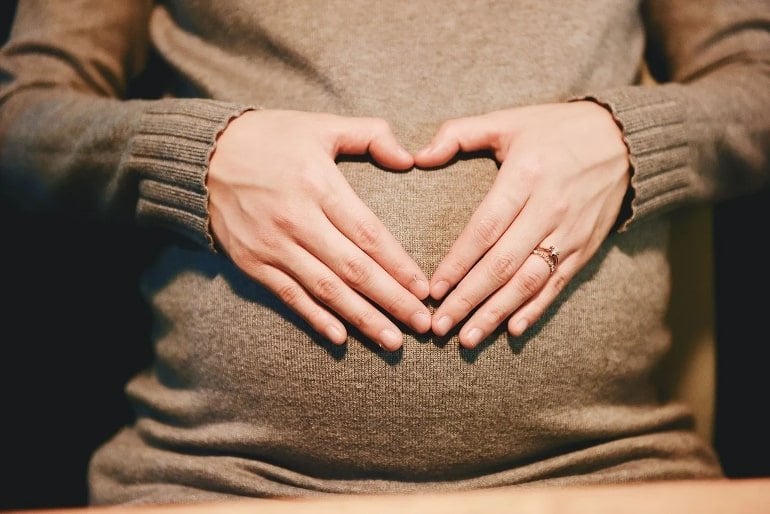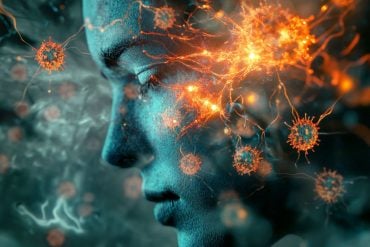Summary: A new study sheds light on the neurobiology of cravings for certain foods women experience while pregnant. According to researchers, during pregnancy, the brain undergoes alterations to functional connections in the reward systems, as well as taste and sensorimotor centers. Pregnant females become more sensitive to sweet foods and develop binge eating behaviors toward high-calorie foods. Pregnancy induces a full reorganization of the mesolimbic neural circuits via D2R dopaminergic neurons in the nucleus accumbens.
Source: University of Barcelona
Many people have felt the sudden and uncontrollable urge to eat a certain food. These urges —known as cravings— are very common, mostly during pregnancy. At this stage, the mother’s body undergoes a series of physiological and behavioral changes to create a favorable environment for the embryo’s development.
However, the frequent consumption of tasty and high-calorie foods —derived from cravings— contributes to weight gain and obesity in pregnancy, which can have negative effects on the baby’s health.
“There are many myths and popular beliefs regarding these cravings, although the neuronal mechanisms that cause them are not widely known”, notes March Claret, lecturer at the Faculty of Medicine and Health Sciences of the University of Barcelona and head of the IDIBAPS Neuronal Control of Metabolism Group.
Claret leads, together with the researcher Roberta Haddad-Tóvolli, a study published in the journal Nature Metabolism that provides new evidence on the alterations of the neuronal activity that drive cravings in an animal model.
Dopamine and compulsive eating behaviour
According to the results, during pregnancy, the brain of female mice undergoes changes in the functional connections of the brain reward circuits, as well as the taste and sensorimotor centers.
Moreover, just like pregnant women, female mice are more sensitive to sweet food, and they develop binge-eating behaviours towards high calorie foods.
“The alteration of these structures made us explore the mesolimbic pathway, one of the signal transmission pathways of dopaminergic neurons. Dopamine is a key neurotransmitter in motivational behaviours”, notes Claret, member of the Department of Medicine of the UB and the Diabetes and Associated Metabolic Diseases Networking Biomedical Research Centre (CIBERDEM).
The team observed the levels of dopamine —and the activity of its receptor, D2R— to increase in the nucleus accumbens, a brain region involved in the reward circuit.
“This finding suggests that the pregnancy induces a full reorganization of the mesolimbic neural circuits through the D2R neurons”, notes Haddad-Tóvolli.
“These neuronal cells —and their alteration— would be responsible for the cravings, since food anxiety, typical during pregnancy, disappeared after blocking their activity”.
The team led by Claret and Haddad-Tóvolli showed that persistent cravings have consequences for the offspring. They affect the metabolism and development of neural circuits that regulate food intake, which leads to weight gain, anxiety and eating disorders.

“These results are shocking, since many of the studies are focused on the analysis of how the mother’s permanent habits —such as obesity, malnutrition, or chronic stress— affect the health of the baby. However, this study indicates that short but recurrent behaviours, such as cravings, are enough to increase the psychological and metabolic vulnerability of the offspring”, concludes Claret.
The conclusions of the study could contribute to the improvement of nutritional guidelines for pregnant women in order to ensure a proper prenatal nutrition and prevent the development of diseases. Among the participants in the study were Guadalupe Soria and Emma Muñoz-Moreno (IDIBAPS), Analía Bortolozzi (IIBB-CSIC-IDIBAPS) and Emmanuel Valjent (INSERM and University of Montpelier).
Funding: This project received funding from the European Research Council (ERC), given to Marc Claret, and a grant from the Marie Skłodowska-Curie Actions program, given to the researcher Roberta Haddad-Tóvolli.
About this pregnancy and cravings research news
Author: Rosa Martínez
Source: University of Barcelona
Contact: Rosa Martínez – University of Barcelona
Image: The image is in the public domain
Original Research: Closed access.
“Food craving-like episodes during pregnancy are mediated by accumbal dopaminergic circuits” by March Claret et al. Nature Metabolism
Abstract
Food craving-like episodes during pregnancy are mediated by accumbal dopaminergic circuits
Preparation for motherhood requires a myriad of physiological and behavioural adjustments throughout gestation to provide an adequate environment for proper embryonic development.
Cravings for highly palatable foods are highly prevalent during pregnancy and contribute to the maintenance and development of gestational overweight or obesity. However, the neurobiology underlying the distinct ingestive behaviours that result from craving specific foods remain unknown.
Here we show that mice, similarly to humans, experience gestational food craving-like episodes.
These episodes are associated with a brain connectivity reorganization that affects key components of the dopaminergic mesolimbic circuitry, which drives motivated appetitive behaviours and facilitates the perception of rewarding stimuli.
Pregnancy engages a dynamic modulation of dopaminergic signalling through neurons expressing dopamine D2 receptors in the nucleus accumbens, which directly modulate food craving-like events.
Importantly, persistent maternal food craving-like behaviour has long-lasting effects on the offspring, particularly in males, leading to glucose intolerance, increased body weight and increased susceptibility to develop eating disorders and anxiety-like behaviours during adulthood.
Our results reveal the cognitively motivated nature of pregnancy food cravings and advocates for moderating emotional eating during gestation to prevent deterioration of the offspring’s neuropsychological and metabolic health.






